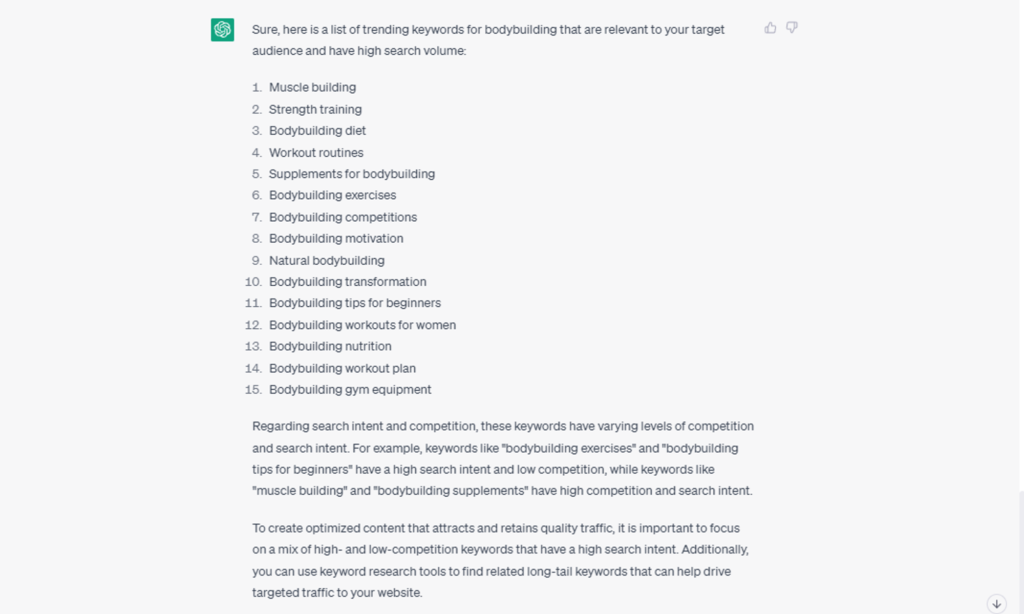
How To Conduct keyword Research For Content With ChatGPT

Keyword research is a crucial step in creating content that ranks well in search engines and attracts organic traffic. With the advancement of AI technology, tools like ChatGPT can assist in the keyword research process, providing valuable insights and suggestions. In this blog, we will guide you on how to conduct keyword research for your content using ChatGPT.
Understanding the Importance of Keyword Research
Before diving into the process, it’s essential to understand why keyword research is crucial for content creation. Keywords are the words or phrases that people use when searching for information online. By targeting relevant keywords in your content, you can increase your chances of ranking higher. In search engine results pages (SERPs) and driving targeted traffic to your website. This not only enhances a website’s search engine ranking. But also ensures that the content speaks directly to the needs and interests of the audience.
Keyword research helps you identify the terms and phrases that your target audience is searching for. By incorporating these keywords into your content, you can optimize it for search engines and improve its visibility. Effective keyword research strategies to craft compelling and discoverable content. Creating a harmonious bridge between what users seek and what brands aim to convey. The synergy between quality content and strategic keyword integration is the cornerstone of successful digital communication.
Step-by-Step Guide to Conducting Keyword Research for Content with ChatGPT
Step 1: Define Your Content Goals
Before diving into keyword research, it’s important to clearly define your content goals. Ask yourself:
- What is the purpose of your content?
- Who is your target audience?
- What information or value do you want to provide?
Having a clear understanding of your content goals will help you identify relevant keywords that align with your objectives.
Step 2: Brainstorm Seed Keywords
Start by brainstorming a list of seed keywords. These are the basic terms or phrases that are related to your content topic. Use ChatGPT to generate ideas by asking questions like:
- “What are the specific questions people might have about this topic?”
ChatGPT can provide you with a wide range of suggestions that you may not have thought of on your own.
Step 3: Expand Your Keyword List
Use ChatGPT to generate variations and synonyms of your seed keywords. This will help you uncover additional keywords that you may have missed.
For example, if your seed keyword is “healthy recipes,” you can ask ChatGPT:
- “What are some synonyms for ‘healthy’?”
- “What are some other words for ‘recipes’?”
By expanding your keyword list, you increase the chances of targeting a wider range of search queries.
Step 4: Analyze Keyword Relevance
Now that you have a comprehensive list of keywords, it’s time to analyze their relevance and search volume. Use ChatGPT to determine the relevance of each keyword to your content goals. Additionally, you can ask ChatGPT about the search volume of specific keywords by asking:
- “How often is the keyword ‘keyword’ searched for?”
- “What is the search volume of the keyword ‘keyword‘?”
By analyzing both relevance and search volume, you can prioritize keywords that are not only relevant to your content but also have a decent search volume.
Step 5: Assess Keyword Competition
Use ChatGPT to assess the competition level of your chosen keywords by asking:
- “How competitive is the keyword ‘keyword’?”
- “What is the difficulty level of ranking for the keyword ‘keyword’?”
Based on the competition level, you can decide whether to target highly competitive keywords or focus on less competitive ones to increase your chances of ranking higher in search results.
Step 6: Refine and Finalize Your Keyword List
Using the insights gained from ChatGPT, refine and finalize your keyword list. Remove any irrelevant or low-search-volume keywords and focus on those that are highly relevant. Have decent search volume, and manageable competition.
Step 7: Create High-Quality Content
With your finalized keyword list in hand, it’s time to create high-quality content. Incorporate your keywords naturally into your content, ensuring that they flow seamlessly and provide value to your readers.
Remember, keyword research is just the first step. Creating valuable and engaging content is equally important for your overall content strategy.
Using ChatGPT for Keyword Research
ChatGPT is an AI-powered language model that can generate human-like responses based on the input provided. While it doesn’t have direct access to the internet or specific keyword research tools. It can still assist in the keyword research process.
Here’s how you can leverage ChatGPT for keyword research:
- Generate keyword ideas: Start by providing ChatGPT with a general topic or seed keyword. Ask it to generate a list of related keywords or phrases that you can consider targeting in your content. For example, if your topic is “healthy recipes,” you can ask ChatGPT to generate a list of related keywords. Such as “easy healthy recipes,” “quick healthy meals,” or “healthy dinner ideas.”
- Get keyword suggestions: Once you have a list of seed keywords, you can ask ChatGPT to provide specific keyword suggestions. For example, if one of your seed keywords is “healthy recipes,” you can ask ChatGPT to generate long-tail keyword suggestions like “healthy recipes for weight loss” or “healthy recipes for kids.”
- Analyze keyword competition: ChatGPT can help you assess the competitiveness of keywords. You can ask it to provide insights on the difficulty level of ranking for specific keywords or phrases. This information can guide you in selecting keywords that have a higher chance of ranking well.
- Refine your keyword list: Based on the generated keyword ideas and suggestions, you can refine your keyword list. Choose keywords that align with your content goals, have a reasonable search volume, and are relevant to your target audience.
- Optimize your content: Once you have a finalized keyword list, you can start optimizing your content. Incorporate the keywords naturally into your headings, subheadings, meta tags, and throughout the body of your content. Remember to prioritize user experience and readability while optimizing for search engines.
Prompts For Conducting keyword Research
Prompt 1
“Hello, ChatGPT Can you please generate a comprehensive list of high-volume keywords for [TOPIC] that are relevant to [TARGET AUDIENCE]? Additionally, could you kindly include any related keywords or phrases that may be useful for optimizing content? While generating the list, please ensure that the suggested keywords have low competition to maximize the potential for ranking higher on search engines and attracting more traffic to my website. Thank you!”
Prompt 2
“Hello, ChatGPT I am in need of some assistance in optimizing my content for search engines. Could you please provide me with detailed insights into the search intent and competition for the keywords [KEYWORD 1], [KEYWORD 2], and [KEYWORD 3]? I would also appreciate it if you could suggest any related keywords or phrases that may be useful for optimizing my content, as I would like to create high-quality content that attracts and retains potential readers. Thank you!”
Prompt 3
“Hello, ChatGPT I would be grateful if you could generate an extensive list of long-tail keywords for [TOPIC] that are specific to [TARGET AUDIENCE] and have high search volume. Additionally, please provide me with any relevant data or statistics to support the suggested keywords. I am looking to create content that is well-optimized for search engines and attracts quality traffic. Thank you in advance!”
Prompt 4
“Hello, ChatGPT I am looking to optimize my website for local search and would greatly appreciate it if you could provide me with some insights into the local search volume and competition for the keywords [KEYWORD 1], [KEYWORD 2], and [KEYWORD 3]. I would also welcome any suggestions you may have for any related keywords or phrases that could be useful for optimizing my content. Thank you for your help!”
Prompt 5
“Hello, ChatGPT Please help me by generating a comprehensive list of trending keywords for [TOPIC] that are relevant to [TARGET AUDIENCE] and have high search volume. Furthermore, I would be grateful if you could provide me with any insights into the search intent and competition for the suggested keywords. I am looking to create optimized content that attracts and retains quality traffic, and any help you can provide would be greatly appreciated. Thank you!”
Result

Read More: Learn Developing Webinars With ChatGPT.
Tips For Conducting keyword Research
Finnal Words
Keyword research is a vital step in content creation, and leveraging AI-powered tools like ChatGPT can provide valuable assistance. By using ChatGPT to generate keyword ideas, get suggestions, analyze competition, and refine your keyword list, you can optimize your content for search engines and attract targeted organic traffic.
Remember to combine ChatGPT’s insights with existing keyword research tools to create a well-rounded keyword strategy. By incorporating relevant keywords naturally into your content, you can improve your chances of ranking higher in search engine results and reaching your target audience effectively.
For more such information come to our array of prompts.








